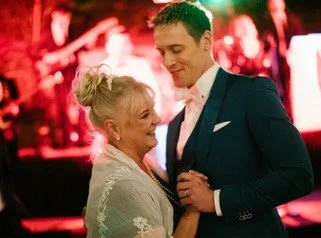In 2008, the journey with my mother took a significant hit after the Mormons funded the California vote in favor of Prop 8 to ban gay marriage. Even in sobriety, despite those early recovery years feeling closer to her than I ever had, I was still clinging to the hope that she would one day renounce her beliefs.
But that was a pipe dream.
The years that followed were met with more disappointments. And the more my esteem grew in recovery, the more painful the disappointments became.
I had to accept that she would never change.
I had to protect and save my little boy self.
I needed to let go of the mother I expected her to be and let her be the mother she was, which wasn’t enough.
So I made the impossible choice to never speak to her again.
To grieve her as if I lost her.
And I thought getting sober off methamphetamines would be the hardest thing I’d ever have to do…
But there is a happy ending.
When my now husband met my mother for the first time, it was one of the first few interactions I had with her after years apart. She was unavoidable at life-marking events in my siblings’ lives, and gradually, the waters were tested until I felt confidently free from emotional reactions toward her (aka being triggered). But, I was very wrong. She made an innocent comment that set me off.
Later, in our hotel room, my fiancé casually remarked, “Why don’t you just forgive her?”
“Forgive her? Do you have any idea what she’s done to me?”
“Yeah, but, like you said, you’re not that person anymore.”
I scoffed – as if forgiveness were that easy.
“She should be asking for my forgiveness!”
He laughed. “Don’t laugh at me!” I snapped.
“Sorry, but you did all that work to stay away, yet you still hold resentment. What was the point?”
I scoffed again. My mouth dropped. I thought I had moved on. I thought I was healed. Was I still expecting her to change?
Damn.
I needed a new approach.
That’s when I realized forgiveness is an active verb.
I was going to experiment and see what would happen if, in my mind, I wholeheartedly repeated “I forgive you” toward my mother when in her presence for the rest of the trip. She would have no idea.
We’d share a meal.
“I forgive you.”
A walk.
“I forgive you.”
A drive.
“I forgive you.”
On and on I would experiment. Hoping to be free.
Until the last day, my mother asked to speak with me alone. That was unusual but good because I could use the opportunity to say “I forgive you” out loud. Perhaps-
“I don’t know why, but I had an idea for something I wanted to try, and I’m hoping you’ll let me,” She said.
I nodded, confused.
“M’kay,” she said, sitting me down on the love seat, “this may sound strange, but lie down and put your head on my lap.”
It’s too much intimacy that I am not prepared for, but still, I awkwardly scrunched my entire 6’4, 220-pound frame on the love seat, resting my head on her lap.
I flinched when I suddenly felt her hand stroking my hair. What is going on?
I can’t look up because I think she’s already crying. “I just wanted to speak to that child inside of you. To that four-year-old. I wanted him to know – I am so, so, so sorry. He is right to be upset. His childhood was not fair. And I wish it had gone better for him. I hope one day he can forgive me.”
She continued stroking my hair. I swallowed the most enormous lump in my throat. “I see him still in so much pain,” she said, “and I just want him to know he’s loved. And I love him. And I wish it were different. But it’s not. And I’m so, so sorry because of that.”
It’s as if I were the four-year-old who received that which he had sought after his entire life.
I was so moved that I vowed to forgive her entirely. But how? Internally, repeating “I forgive you” was giving space between her words/behavior and my reactions but that wasn’t enough. Within that interstice my growing awareness could see that I as the adult was fine; it was the child in me still emotional even after hearing this from my mother. But why? He wasn’t alone anymore. He wasn’t abandoned. He had love, and understanding. So, then why?



